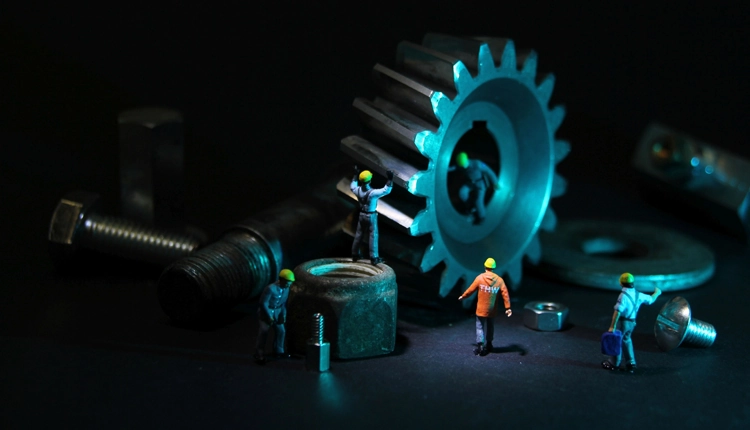
Keep your fleet moving
Railcar repair & maintenance plays a vital role in optimizing the safety, reliability, & performance of your fleet. From routine inspections & preventive measures to addressing malfunctions & damages, these services are essential for ensuring the efficient operation of your railcar fleet. PFL's team can proactively identify & address potential issues before they escalate. By implementing preventive measures & promptly attending to wear & tear on critical components such as brakes, couplers, wheels, bearings, & suspension systems, PFL can help prevent breakdowns, reduce downtime, & extend the lifespan of your railcars.
In the event of malfunctions or damages, efficient repair services & crucial. Our expert technicians can swiftly diagnose & address structural damage, faulty equipment, interior refurbishments, & mechanical issues.
Whether it's minor fixes or major overhauls, timely & effective repairs ensure the seamless functioning of railcars, contributing to the overall reliability & safety of rail transportation systems.
Investing in railcar repair & maintenance not only enhances safety but also boosts performance. Well-maintained railcars operate at optimal efficiency, reducing fuel consumption & minimizing environmental impact. Additionally, adhering to maintenance schedules & industry best practices ensures compliance with regulatory standards, guaranteeing the highest levels of safety for both passengers & cargo.
Trusting in the expertise of the experienced professionals at PFL ensures that railcars remain in peak condition & ready to meet the demands of a fast-paced & ever-evolving rail transportation landscape.Contact us todayto learn more about our Relentless Service™ & how we can enhance the performance & longevity of your railcar fleet.
Repair Capabilities include
- Valve & Gasket Rebuild/Replacement:
A maintenance procedure to restore or replace valves & gaskets in industrial equipment. It ensures proper functionality, prevents leaks, & maintains safe operation.
- Painting
- Stenciling - Restenciling
- Reflectorization:
the process of applying reflective materials to railcars to enhance visibility in low-light conditions. It improves safety by making railcars more visible to drivers, reducing the risk of accidents
- Railcar inspections:
Identify potential issues early on, allowing for necessary repairs or maintenance to be carried out, thereby minimizing the risk of accidents & ensuring the efficient operation of railcar fleets.
- Visual Inspection:
Inspectors visually examine the exterior & interior of the railcar, looking for signs of damage, wear, or corrosion. This includes checking the structure, fittings, valves, couplers, wheels, brakes, & other components for any abnormalities or defects.
- Mechanical Inspection:
Inspectors assess the mechanical systems of the railcar, such as the braking system, suspension, couplers, & draft gear, to ensure proper functioning. They check for any signs of wear, loose connections, or malfunctions that could affect the railcar's performance or safety.
- Safety Systems Inspection:
Inspectors verify the functionality of safety systems, such as emergency brakes, warning devices, and safety appliances, to ensure they are in proper working order.
- Load Capacity Inspection:
Inspectors assess the railcar's load capacity to ensure that it is within the specified limits. This involves checking load restraining devices, reviewing load securement methods, & confirming that the railcar is suitable for the intended cargo.
- Documentation Review:
Inspectors review the railcar's documentation, including maintenance records, repair history, & compliance certificates, to ensure that the railcar is up to date with inspections, maintenance, & regulatory requirements.
- Compliance Check:
Inspectors verify that the railcar meets relevant safety & regulatory standards. This includes compliance with requirements related to design, construction, markings, and operating conditions.
- Visual Inspection:
- Wheel Replacement:
a maintenance procedure that involves removing worn or damaged wheels by installing new ones. It includes conducting inspections to ensure proper alignment and functionality.
- Bubble Leak Testing:
a non-destructive method used to detect & locate leaks. A soap solution is applied to the railcar's surface, & bubbles form at leak points. It is a cost-effective way to identify & repair leaks, ensuring the safety of transporting liquids or gases.
- Ultrasonic Thickness Testing:
a non-destructive method that uses sound waves to measure material thickness. It involves an ultrasonic gauge & a coupling agent applied to the surface for accurate readings.
- Air Brake Testing:
a vital process to verify the functionality and safety of vehicles with air brake systems. It involves inspecting components, checking for leaks, assessing brake performance, & measuring air pressure to ensure compliance with regulations. Regular testing is crucial for maintaining proper brake operation and preventing accidents.
Why Choose us?
PFL's team has a diverse background allowing for creative and innovative strategies for keeping your railcars moving.
